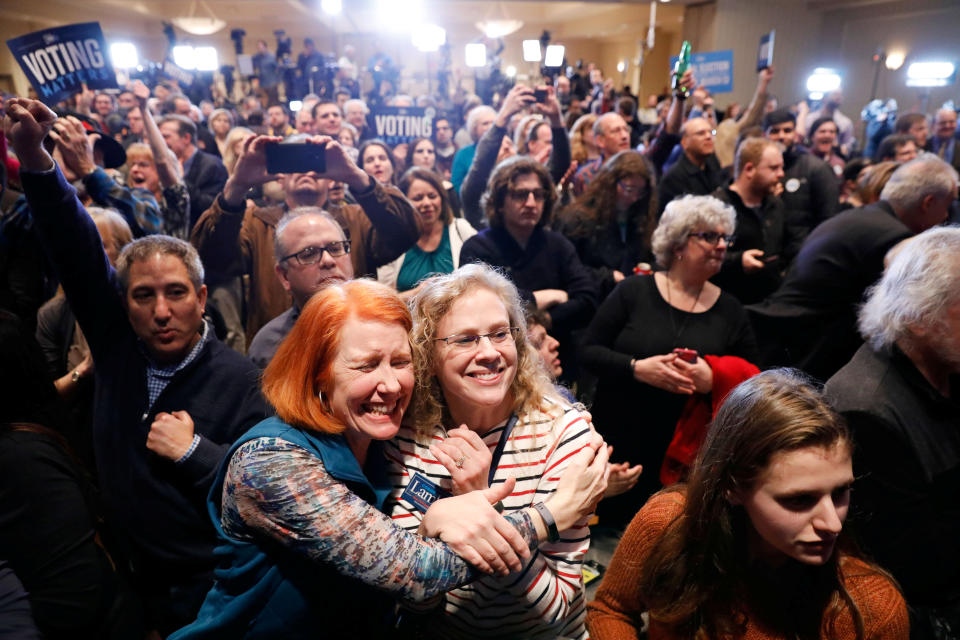Democrats dissect Lamb's win with an eye to November's races

With Democrat Conor Lamb holding on to a margin of a few hundred votes in Tuesday’s special election to fill a Pennsylvania House seat, strategists from both parties were frantically seeking lessons in the outcome that will help them in the midterms this fall.
What combination of Lamb’s personal qualities, policy positions, grassroots organizing, labor-union support and disaffection with Donald Trump led to the apparent victory by the 33-year-old first-time candidate over Republican state representative Rick Saccone in an overwhelmingly Republican district on the West Virginia border?
Lamb’s local supporters credit his support from labor unions and a resistance movement that began organizing the district almost a year ago, long before the incumbent congressman resigned in a sex scandal. But the parties also are taking note of Lamb’s biography, as a former prosecutor and Marine veteran, and his moderate positions on hot-button social issues. “We can win even the reddest districts if we recruit candidates who fit them,” Democratic strategist Lis Smith said Wednesday. “We cannot and should not expect Democrats who run in western Pennsylvania to espouse West Village political views.” Republican National Committee spokeswoman Kayleigh McEnamy expressed the views of many on the right when she said Lamb “has essentially run as a Republican.”
But as important as Lamb’s views were — personally opposed to abortion, but a supporter of existing abortion rights laws; for stronger gun purchase background checks but against a new assault weapons ban — the nature of the mixed suburban-rural district itself made his victory possible. That means that any lessons drawn from Lamb’s victory may well be applicable in similar districts — but not necessarily in those that lack a strong union base.

“The boots on the ground of grassroots activists and reinvigorated labor organizers … won back a Trump plus-20 district door by door, call by call,” an elated Valerie Fleisher, a leader of 412 Resistance, a suburban Allegheny County activist group begun shortly after Trump’s 2016 victory, told Yahoo News. “It was such a great night for the grassroots activists that had been organizing in the district for 14 months.”
With 100 percent of precincts reporting, Lamb had a lead of fewer than 1,000 votes out of the more than 226,000 cast, with provisional ballots not due to be counted until Friday. Lamb claimed victory Tuesday night, but Saccone had not conceded as of Wednesday morning. A recount would not automatically be triggered under such circumstances, but the Saccone campaign could petition for one, and Republicans may well do so.
“We followed what I learned in the Marines — leave no one behind. We went everywhere; we talked to everyone; we invited everyone in,” Lamb told supporters at his victory party.
Should the election results be certified as is or confirmed on recount, Lamb would succeed eight-term Republican Rep. Tim Murphy, who stepped down from his spot representing the 18th district in October following news reports the married Pro-Life Caucus member had suggested his mistress consider getting an abortion. Lamb will represent a district that is set to disappear under a court-ordered redistricting plan that breaks up the population of the 18th District just in time for the fall’s midterm elections. As an incumbent who overcame a huge Republican advantage to win the 18th, he would be strongly positioned to retain his new title in a face-off against Rep. Keith Rothfus in the new 17th district, which will be more Democratic than the 18th, this fall. Saccone, who campaigned on a promise to be Trump’s “wingman” in Congress, has indicated he is likely to seek election in the new 14th district, which will be an open seat expected to favor Republicans.

The victory is the first by a Democratic special election candidate in a hotly contested Republican-held district since Trump won office, after a string of narrow defeats in which Democrats substantially outperformed historical patterns in their districts. Trump won the district by a nearly 20-point margin, and both he and Vice President Pence had campaigned for Saccone. Democrats gleefully suggested that the rally Trump hosted on Saturday, where he gave a meandering speech that touched on an array of inflammatory topics, had backfired. In the end, neither Trump’s last-minute appearance nor his controversial — though welcome in the district — announcement that he would impose tariffs on imported steel and aluminum was enough to overcome his unpopularity and the weakness of the Saccone campaign. Support for Trump in the district fell 20 points over the course of 2017, according to one poll, and while Saccone did better than many had predicted, Lamb’s ability to overcome the structural disadvantages of the district shows what can happen when Democratic distaste for the president matures into an organized electoral force.
“I think most Republicans realize we’re running into a very serious headwind — hurricane-force wind,” Rep. Charlie Dent, R-Pa., said early Wednesday of the improbable victory.
The much discussed blue wave or Democratic headwinds GOP candidates are seeing is not a force of nature like the weather, however, but something being built painstakingly from the ground up by grassroots Democratic volunteers. In Pennsylvania’s 18th District, they began organizing against Murphy, who had not even had a challenger the last two election cycles, shortly after Trump’s election, holding weekly rallies and protests at his district offices. Once Lamb joined the race, they tapped an existing power structure that had been allied in recent years with Murphy: the old-line industrial labor unions.
“What’s really powered this, the viability of the campaign, is two separate forces that have managed to work well together,” Lara Putnam, the chair of the history department at the University of Pittsburgh, who has been studying the resistance organizing in southwestern Pennsylvania since it began, told Yahoo News. Voters in the Pittsburgh suburbs of Allegheny County powered Lamb’s win, even as he lost to Saccone in the more rural and industrial parts of the 18th District. Turnout was higher in Allegheny County than in the GOP stronghold of Westmoreland.

“We were already organized to flip this district, so [Lamb] had a base of volunteers from the first minute of this campaign,” said Mykie Reidy, the lead organizer of Progress 18 PA and the 18th District Campaign Coalition, which worked to forge a coalition out of the new resistance groups. “The unions getting behind him helped build on that base.”
“And I also think we had a great candidate who ran a smart campaign,” she added, speaking Tuesday from her Mount Lebanon home, where she’d been running a get-out-the-vote staging location for the Lamb campaign for the past week.
“The fact that Lamb reached out to labor and labor reached out to Lamb — the AFL-CIO, United Steelworkers, United Mine Workers, Retired Mine Workers of America — the fact that unions were supporting Lamb and saw in Lamb someone who respected them, respected the work they did, respected the promises made to them — issues around pensions are really critical — that was profoundly impactful,” said Putnam. “Those informal networks — the communications sustained by the unions — are super powerful.”
About 23 percent of workers in the 18th District belong to unions, compared to less than 10 percent of the private sector workforce nationwide.
Republican outside groups spent heavily on the race, pouring more than $10.7 million into the contest. Most of that money came from Paul Ryan-backed super-PAC the Congressional Leadership Fund and the National Republican Campaign Committee. The Lamb campaign spent $3.1 million and drew a further $2.6 million in support from outside Democratic groups.
“The race that Conor has run has been representative of our district and not some cookie-cutter mold that you can then apply to races all over the country,” said Fleisher, who spent 14 months doing organizing work in the district. “I think if there is a blue wave it will be because the Democratic candidates are relying on these new Democratic groups to really understand their districts and their issues, and they are talking to voters about really specific priorities.”

Resistance groups from outside the district also sent in volunteers. “We have shown we can overcome geographic disadvantages … and get out to the suburbs and rural districts that will decide the 2018 midterms. That’s what we did tonight in Pennsylvania. That’s what we’re going to do across the country in November,” predicted Ethan Todras-Whitehill, executive director and co-founder of Swing Left, a national group founded after Trump’s election to funnel blue-state and blue-city energy into organizing and fundraising for potentially flippable neighboring red districts.
The group did phone-banking and canvassing for Lamb, as did a number of smaller resistance and women’s activist groups from the regional Democratic stronghold of Pittsburgh.
That progressives in the district backed Lamb despite his stances opposing an assault weapons ban and abortion was partly a reflection of the intensity of their desire to elect a Democrat. But it also reflected what they learned from knocking on doors and encountering moderate to right-of-center voters who were open to supporting Lamb.
“Speaking for myself, coming from the left wing of the party, I started off this whole enterprise more than a year ago — before I ever heard of Conor Lamb — having a checklist of policies I wanted, and I learned a lot this year about my district and the issues that mattered to them,” said Reidy, who was also a Bernie Sanders delegate in 2016. “I just really came to see that the candidate’s character — his honesty, his willingness to have a conversation with people, his general leadership skills — turns out to be more important than any checklist.”
_____
Read more from Yahoo News:



